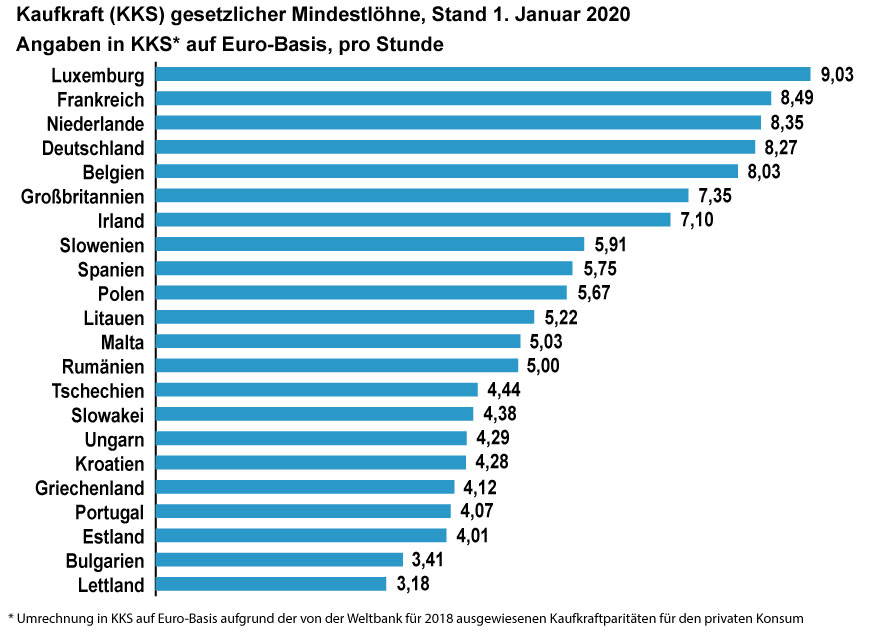Statutory minimum wage
Protection of collective bargaining autonomy requires rule-based adjustments

©AdobeStock luzitanija
The minimum wage has displaced existing collective agreements and may lead to permanent state interference in the wage structure. It also creates barriers to hiring for the weakest in the labour market and imposes bureaucratic obligations on companies.
The successful German collective bargaining system with its high mandate to the parties to collective agreements, protected by the Basic Law, to autonomously agree on wages has been considerably burdened by the statutory minimum wage. The legislator should therefore at least help to avoid unnecessary further bureaucracy. This includes, for example, a sensible limitation of the client's liability. To ensure that the minimum wage does not undermine collective bargaining autonomy to any great extent in the future, it is essential that its adjustment continues to be based on the wage index. Politically motivated increases in contradiction to a moderate adjustment based on the wage index must be avoided.
Allow for meaningful differentiation
The minimum wage must not become a brake on employment in economically difficult times. The exemption provision already in place for the long-term unemployed should be extended to 12 months and extended to other groups of people with placement obstacles in the labour market, e.g. people without training or people who have never worked before. An extension of the exemption criteria should also be considered for internships. The Minimum Wage Act has led to a decline in the number of internships offered by companies. In order to give more young people the opportunity to gain practical experience through an internship, it should therefore be possible for voluntary practical activities to be carried out for at least twelve months without a minimum wage.
Tighten documentation requirements and limit employer liability
The Minimum Wage Act also creates unnecessary bureaucratic burdens for companies. For example, a large number of companies must record the start, duration and end of daily working hours for their employees. Companies incur annual bureaucratic costs of €236 million due to the documentation requirements under the Minimum Wage Act (Report of the Federal Government on the Status of Bureaucracy Reduction and Further Development in the Field of Better Regulation for 2018, page 56). Facilitations are necessary here, e.g. for marginally employed persons the recording of the duration of the daily working time should suffice.
Large bureaucratic burdens are also created across all sectors by the strict liability of contractors. Companies demand confirmation from their contractors that they are complying with the minimum wage obligations or demand collateral in the form of bank guarantees or cash retentions. This means additional administrative work for companies. The principal's liability should be limited to cases in which the principal is accused of fault. In addition, the chain of liability should be limited to the direct contractual partner.
Adjustment of the minimum wage to continue to be oriented to wage developments
On 30 June 2020, the Minimum Wage Commission passed a resolution on the adjustment of the statutory minimum wage for the third time. According to this decision, the minimum wage will be adjusted to € 9.50 with effect from 1 January 2021. From 1 June 2021, the minimum hourly wage will then be €9.60 gross per hour worked. On 1 January 2022, the minimum wage is to increase to €9.82 and finally to €10.45 gross per hour worked on 1 June 2022. In its proposal for the adjustment of the statutory minimum wage, the Minimum Wage Commission is guided by the subsequent development of collectively agreed wages. The Minimum Wage Commission bases its calculation of the subsequent development of collectively agreed wages on the wage index of the Federal Statistical Office, which is calculated on the basis of collectively agreed hourly earnings without special payments. At the same time, this year the Minimum Wage Commission has also taken into account the special situation in view of the Corona pandemic and the changed economic situation in its decision. With the orientation to the wage index, the adjustment of the minimum wage remains rule-bound in accordance with the Minimum Wage Act and the Commission's rules of procedure. This rule-based approach remains indispensable.








